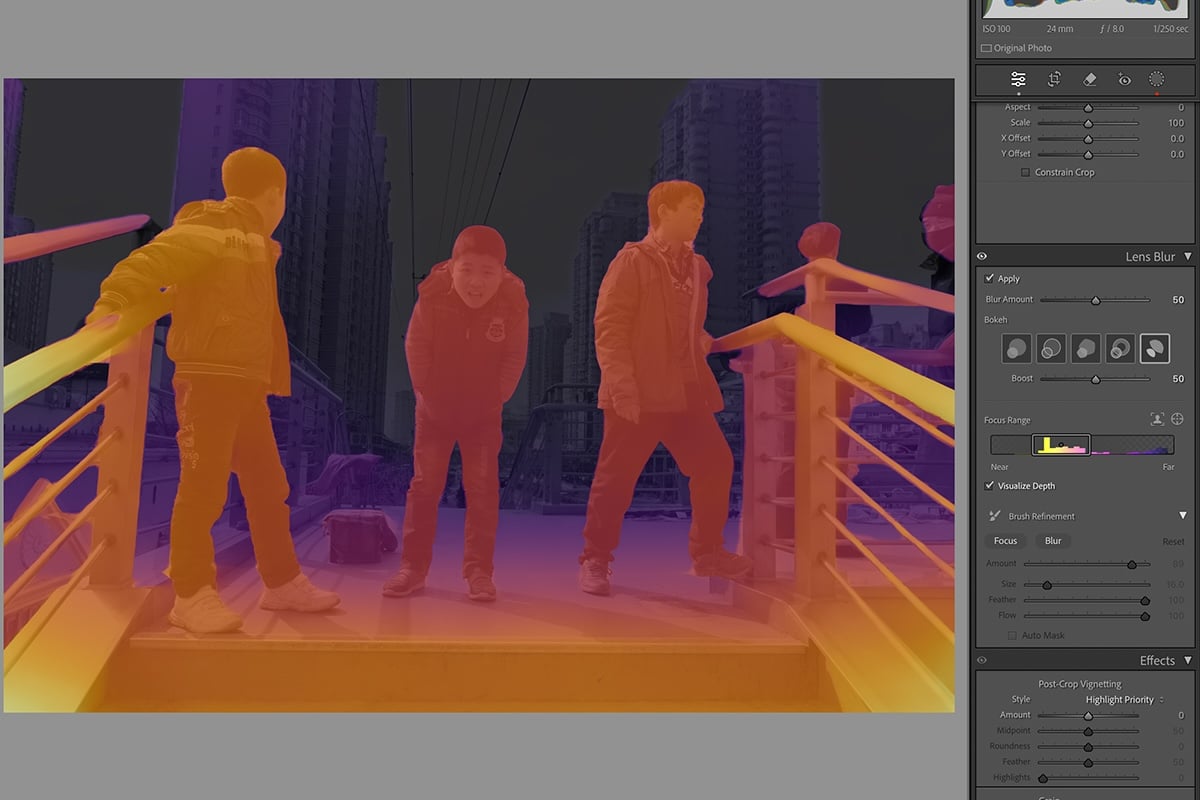DxO's new release of Nik Collection 4 may be just the thing for you if you're looking for new ways to make your photos pop. The Nik Collection includes powerful tools that change your images in ways that other photo editing programs can't. There is a reason the Nik fanbase has been waiting to see what DxO has in store for the plug-ins.
The Nik Collection plug-ins are some of the best around for quickly and flexibly editing your photos. In this DxO Nik Collection 4 review, we will look at the new features to see if the plug-ins are worth the upgrade.

Getting to Know Nik Collection 4
If you are new to the Nik Collection, you will need some background to understand what all the fuss is about. The Nik Collection is a suite of seven, now eight, individual plugins. Each has a distinctive focus. For example, one of the most popular, Silver Efex Pro, converts images to black and white.
The plugins initially were designed to work within Adobe Photoshop. The plugins now work with Photoshop, Lightroom Classic, and DxO Photolab. But you can also use the Nik Collection without a parent photo editing program. The plugins launch as stand-alone programs as long as you are editing JPEG or TIFF files. Nik is not a raw file converter.
There is a slight similarity in the user interface. But for the most part, the plugins function independently.
At first glance, you may think Nik is simply a preset package. Most of the plugins include presets (or recipes). But that's not what makes Nik special. Within many of the plugins are adjustment panels. Each includes sliders that control the specific effect. The tools combine to give your photo a unique look. And you can save your unique collection of tools to use on future images. It is like being able to build your own specific Lightroom Develop module.
But Nik goes further with Control Points, now called U POINTS on the DxO website. Think of Control Points like radial filters in Lightroom. Add a Control Point by clicking on your image. You now have control over the settings within the selected area. You can choose to add extra processing or remove the global settings.
Added together, the Nik Collection is a powerful set of plugins.
Let’s quickly summarise the plugins included in Nik Collection 4.
Analog Efex Pro
This plugin simulates the look of vintage cameras, film, and lenses. It adds film photo effects like light leaks, scratches, motion blurs, and double exposures.
Color Efex Pro
This plugin is a popular color editing tool. Filters cover basic exposure adjustments but go further with adjustments like Detail Extractor, Glamour Glow, Reflector Efex, a Foliage enhancer.
Dfine
Dfine is Nik's noise reduction program for low-light, high-ISO images.
HDR Efex Pro
HDR Efex Pro combines bracketed images or simulates the look of HDR with one image. You can control how the images combine in terms of tonality, color, depth, and detail.
Sharpener Pro Raw Presharpening and Sharpener Pro Output Sharpening
Presharpening enhances the detail of an image. Output Sharpening sharpens the image for printing.
Silver Efex Pro
This plugin is a popular black and white conversion program. Like Color Efex Pro, filters let you selectively change the look of your image. You can adjust structure, film grain, tonality, and tone color.
Viveza
Viveza is another color enhancement program. It emphasizes localized adjustments using Control Points. Control Points are like radial filters. You can globally change colors or select an area for enhancement.
Perspective Efex
The newest addition to the Nik line-up is Perspective Efex. It was launched in 2020 with Nik Collection 3. It automatically adjusts known lens-specific distortions, or you can manually alter geometric distortions.

Color Efex Pro 4 creates pops of color in the dunes and deepens the blues of the sky.
Nik's History
This popular suite of photo editing plugins has a history. Nik plugins have been around since the late 1990s. They were developed by Nik Software, which also developed Snapseed, a popular mobile phone editing app.
Google picked up Nik in 2012. They reduced the price of the Nik Collection to $150 (from $500). This made it much more accessible to the casual photographer and increased its popularity. They also added the powerful Analog Efex Pro plugin to the collection.
In 2016, Google made the suite free. This was great for photographers! But many thought the free status signalled the end to Google's interest in the product. The Nik Collection was about to fade into the history books.
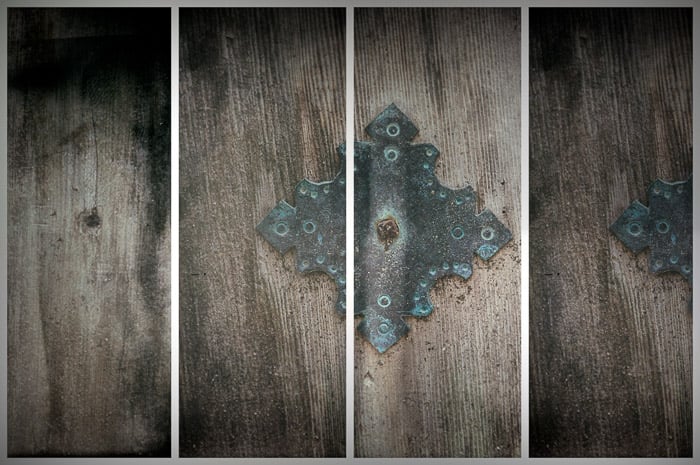
I created this multi-lens image in Nik's Analog Efex Pro 2 using film and photo plate tools.
Enter DxO, a company with a history of developing photo editing tools. They bought the software in 2017 and reinstated Google's price. We all waited to see what DxO had planned for the software.
In 2020, DxO released Nik Collection 3, their first main upgrade to the suite. For many users, the changes were not immediately apparent. But they there was foundational work going on behind the scenes. They upgraded the interface within Adobe Photoshop. They also made the suite accessible directly from Lightroom and DxO's own photo editing program, Photolab. The most apparent change was the introduction of a new plugin, Perspective Efex. In Nik Collection 3, there were tweaks and upgrades, but what DxO did not do was put their distinctive stamp on the Nik plugins. This seems to be changing with the new release.
DxO Nik Collection 4 Review
With Nik Collection 4, DxO has made more apparent changes. However, these changes are isolated and not across the board. It seems the company is content to move slowly and make incremental changes. Both Silver Efex Pro 3 and Viveza 3 have a fresh new look. There are some new tools and presets scattered throughout the plugins. The Control Points, Nik's version of radial filters, are easier to use and seem to be getting a new name, U Points. While there are changes, some plugins remain largely untouched.
The numbering system for the various plugins can be confusing. The upgraded Nik Collection 4 contains:
- Color Efex Pro 4
- Silver Efex Pro 3*
- Analog Efex Pro 2
- Dfine 2
- HDR Efex Pro 2
- Sharpener Pro 3
- Viveza 3*
- Perspective Efex (1)
Only Silver Efex Pro and Viveza (*) have a new version number. This indicates the first major revision since DxO's acquisition of Nik in 2016.
Many photographers continue to use the free version of the Google Nik Collection. But, now that DxO is actively developing the Nik Collection, is it worth the price tag?
New Features in Nik Collection 4
Let's start with what is new in Nik Collection 4. Silver Efex Pro 3 and Viveza 3 have gotten a major makeover, and there are some new presets and tools scattered throughout the suite.
Silver Efex Pro
Silver Efex Pro is one of the most popular Nik plugins. DoX has modernised the user interface and added a new adjustment panel: Clearview. This tool is like the dehaze tool in Lightroom. Comparing a photo edited in an older version of Silver Efex and the new release shows some changes to the presets. For example, the same preset, High Contrast (smooth), in an older version of Silver Efex Pro (left), looks different than the same preset in the newest version (right).
Control Points and Viveza
Viveza 3 is the other plugin chosen for an upgrade. DxO states that this is one of its most popular plugins. But frankly, we had never used the program in the older version. Viveza focuses on localized adjustments using Control Points.
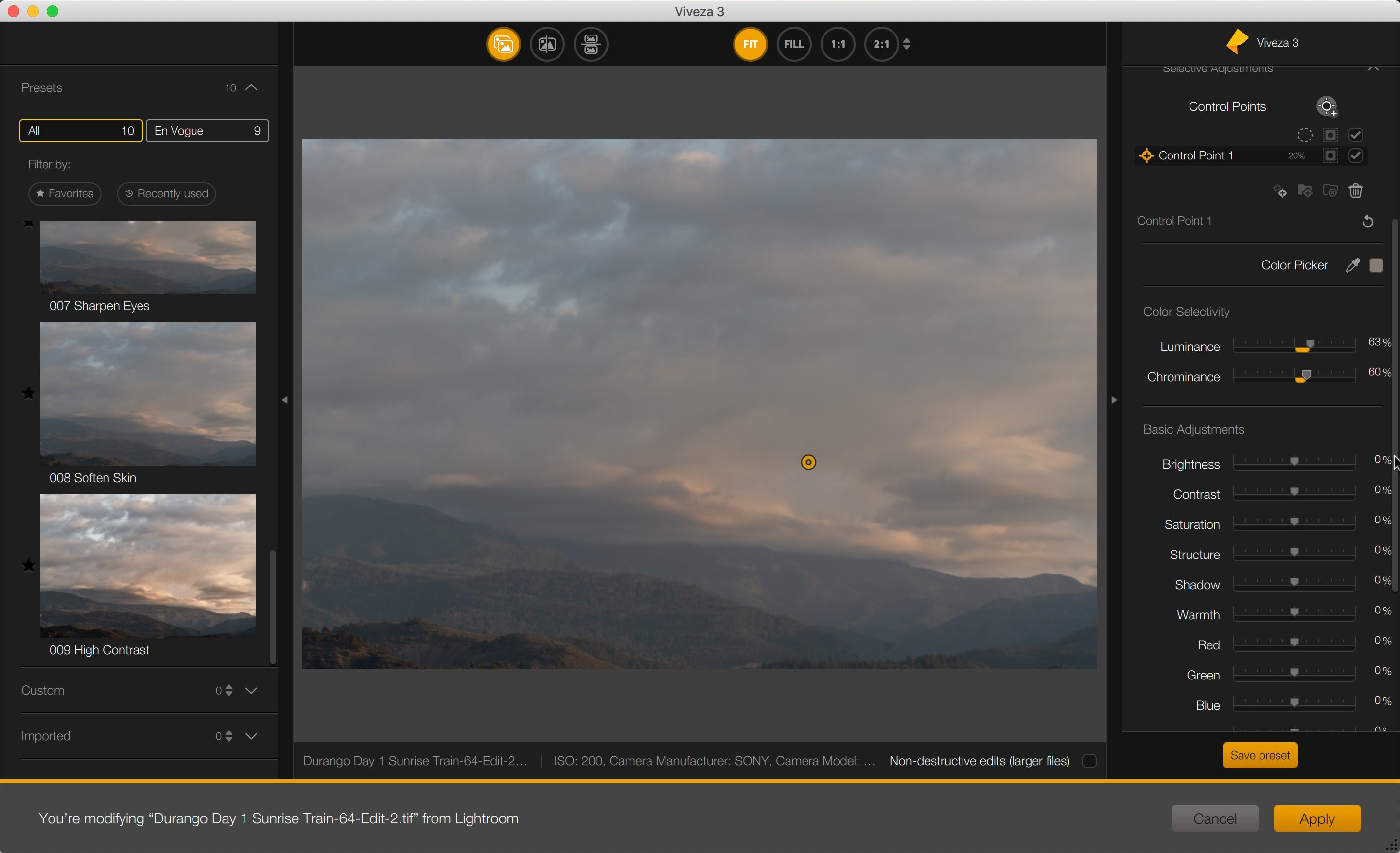
Viveza 3 user interface has a bold new look in Nik Collection 4 and now includes presets. The Control Points are now controlled in a panel in the right-hand column instead of the controls being attached to the Control Point.
Previously, the Control Point sliders were attached to the Control Point itself. This cluttered the visual workspace, and the sliders were sometimes difficult to move. Now, the sliders appear in a separate panel in the right-hand column. Added to the panel are luminance settings. The sliders are easier see and adjust. Also, you can name each Control Point. This helps you keep track when you have many. In addition, Viveza 3 now has presets like those found in the other Efex plugins. Currently, there are only 10 presets included. But you can save your own.
Selective Tool and Meta-Presets in Photoshop
Released in Nik 3 were some foundational changes to how Nik files are processed. There is a non-destructive saving option. This allows you to re-edit a file from where you left off rather than opening an edited file as if it is new each time. Also introduced was the Nik Selective Tool. If you missed the Selective Tool, it is located in a back corner of Photoshop. Open the File drop-down menu and select File > Automate > Nik Selective Tool 2.
With the menu open, you can edit a Smart Object in more than one plugin. The edits appear as editable Smart Filters. This reduces the feeling that each plugin is a silo. There is no need to save out of one plugin and open another to create more complex edits.
In Nik 4, the Selective Tool expanded to include Meta-presets. These presets span the plugins, taking a feature from one plugin and combining it with a feature from another. Currently, there are 10 Meta-presets. Meta-presets are a great addition. But you cannot yet create and save your own Meta-presets.
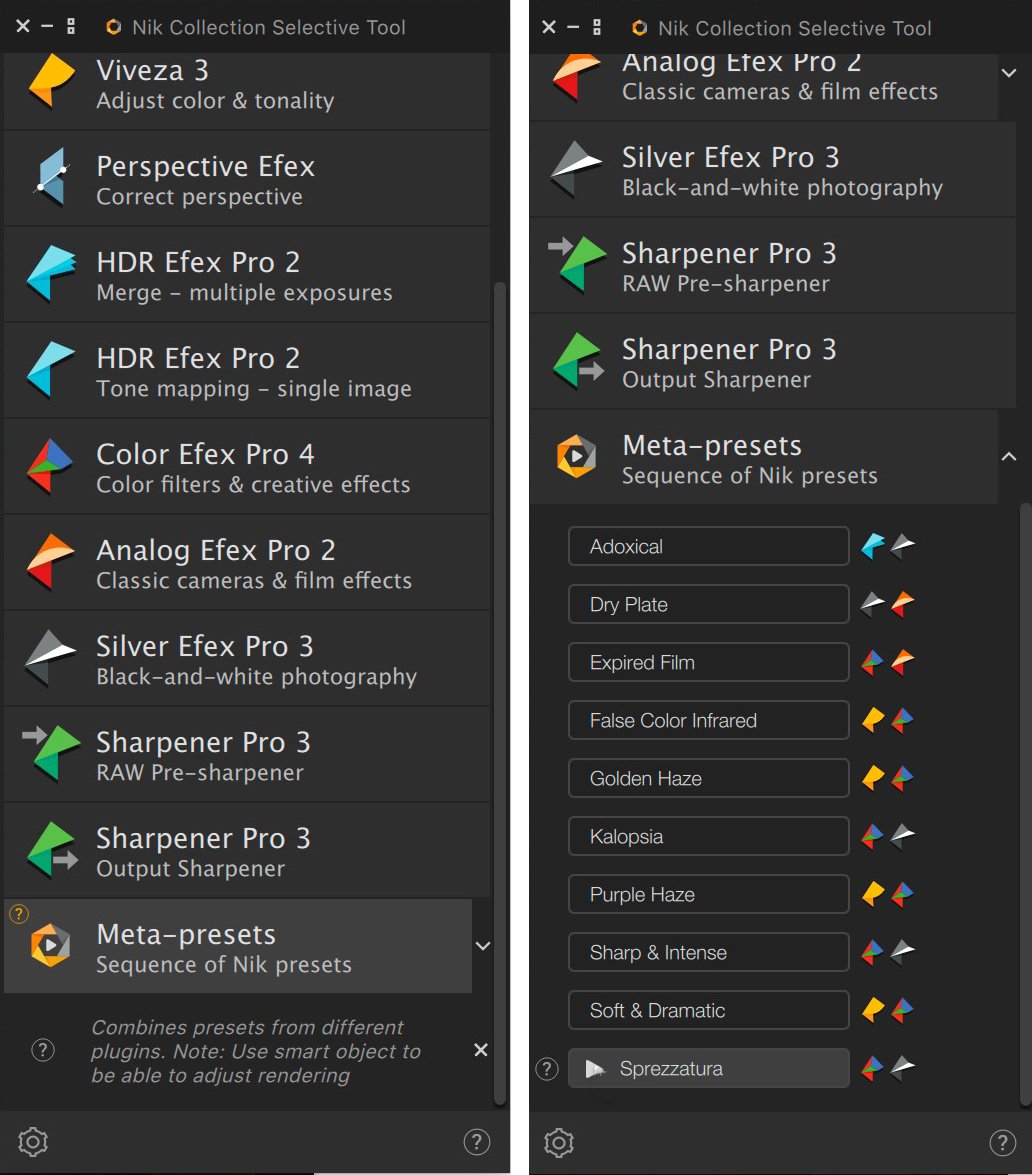
Nik Selective Tool in Photoshop lets you edit an image in more than one plugin. Opening the Meta-presets option will give you presets that use tools from more than one plugin.
Features That are Substantially the Same in Nik 4
While there have been notable improvements, much of the Nik Collection has not changed with this update. Analog Efex, Color Efex, Dfine, HDR Efex, and the Sharpening tools are essentially unchanged. There are a few additional presets scattered across the Efex plugins. But the user interface and tools are substantially the same as the free Google version of Nik. Comparison tests using the same settings or presets give similar results. This shows that the underlying algorithms are also untouched.
Dfine and the Sharpening tools are nowhere near the level of quality offered by competitive programs. See our review of noise reduction programs to see how Dfine fared.
Control Points, now called U Points, seem to be a focus of the current upgrade. Both Silver Efex and Viveza have easier-to-use Control Points. But the upgrades are limited to these plugins. The other plugins retain the older version.
DxO introduced Perspective Efex in Nik Collection 3. Perspective Efex is an expanded version of Lightroom's Lens Correction and Transform tools. It includes tools that affect distortion, volume deformation, perspective, and horizon. You also have a miniaturization tool that uses blur to simulate the look of a tilt-shift lens. It does not appear that the tool has been updated for 2021.
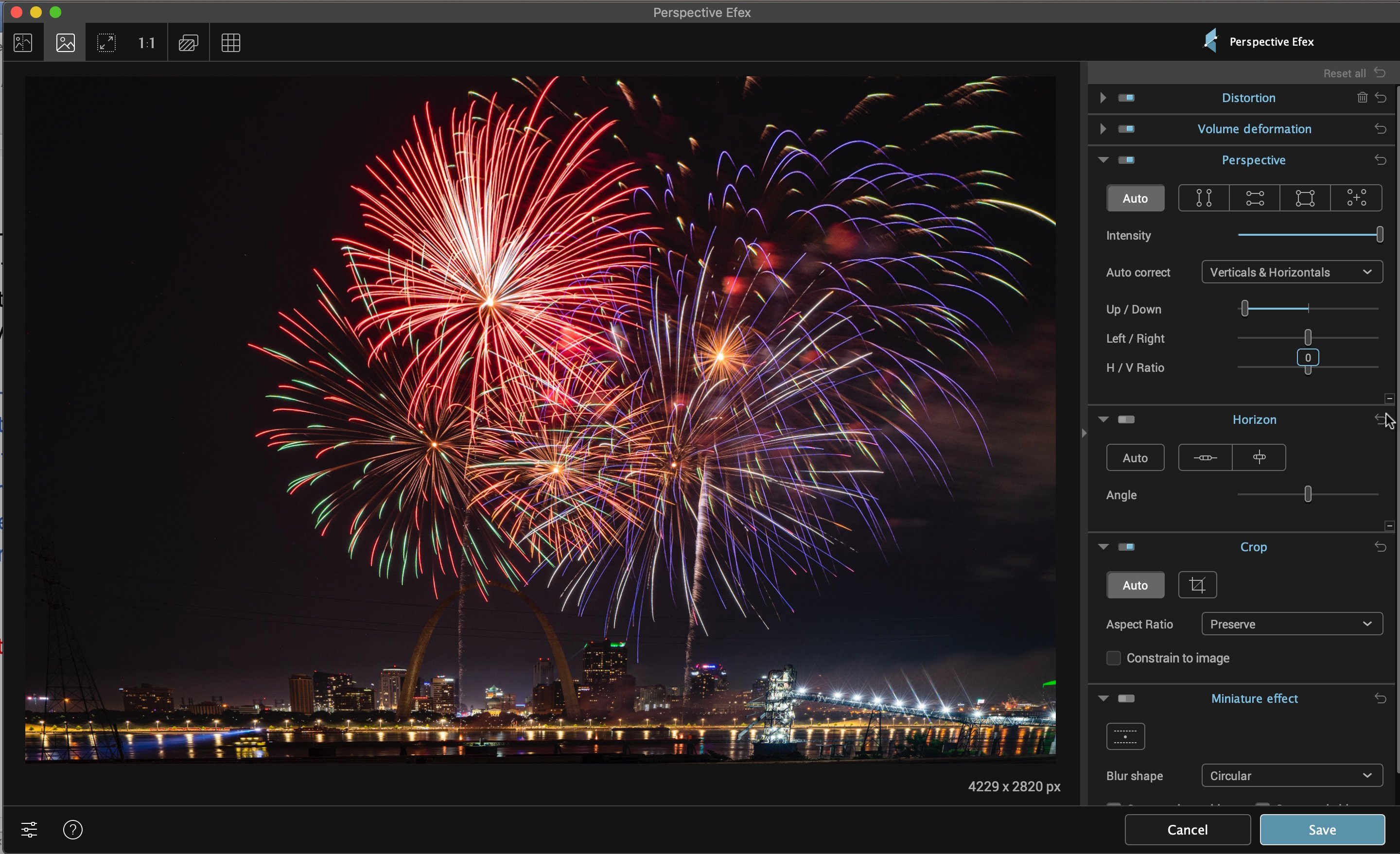
Perspective Efex user interface does not have the bold new look of other plugins and looks the same as when introduced in 2020.
Nik Collection 4 Pricing
It would be one thing if purchasing the suite ensured that you would receive future upgrades to the other plugins in the suite. But if the current pattern holds, each upgrade comes at a price. And there is no predicting what plugins will receive attention next.
The Nik Collection 4 is priced at $149 for the suite. Photographers who purchased Nik Collection 3 can upgrade for $79.
Silver Efex Pro 3 is a popular program and one that will tempt photographers into buying the latest version. But you cannot buy one plugin without buying or upgrading the entire suite.
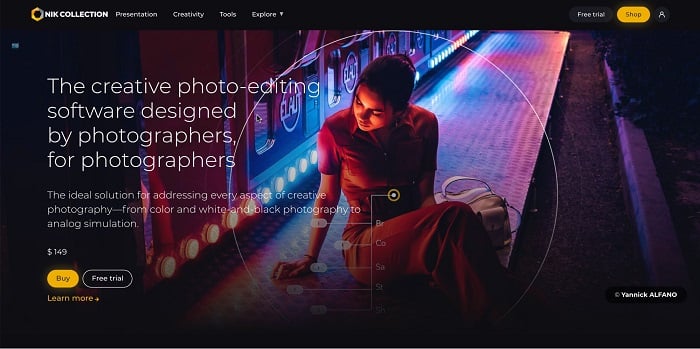
Screenshot of the Nik Collection website
Overall Verdict
DxO has been slow to upgrade the Nik Collection. There is a movement towards modernization with the upgrades to the user interface of Silver Efex Pro 3 and Viveza 3. But in a creative space that sees mind-blowing upgrades nearly every year, the pace is glacial.
In the new release of Nik Collection 4, there is an inconsistency in the upgrades. The user interfaces of Silver Efex and Viveza look and function differently from the other plugins. Though the programs have always had their own personality, the Nik 4 upgrade feels incomplete and premature. Don't get me wrong. The upgrade to Silver Efex Pro is worth it for fans of the plugin. The Meta-presets hint at a future move towards a more integrated user experience. But only time will tell.
The earlier versions, including the free version released by Google, continue to work just fine. The upgrades, especially to Silver Efex Pro 3, almost make the DxO collection worth buying. But we were disappointed that only two of the 8 plugins received an update.
Dfine and HDR Efex both lag behind similar programs in the creative space. Color Efex Pro and Analog Efex Pro are both fan favourites that have yet to see an upgrade. Even the relatively new Perspective Efex plugin doesn't match the new user interface. There are hints that DxO is giving Nik some thought. But a lot of the changes, though useful, are behind the scenes. A casual user of the plugins may not notice the changes at all!
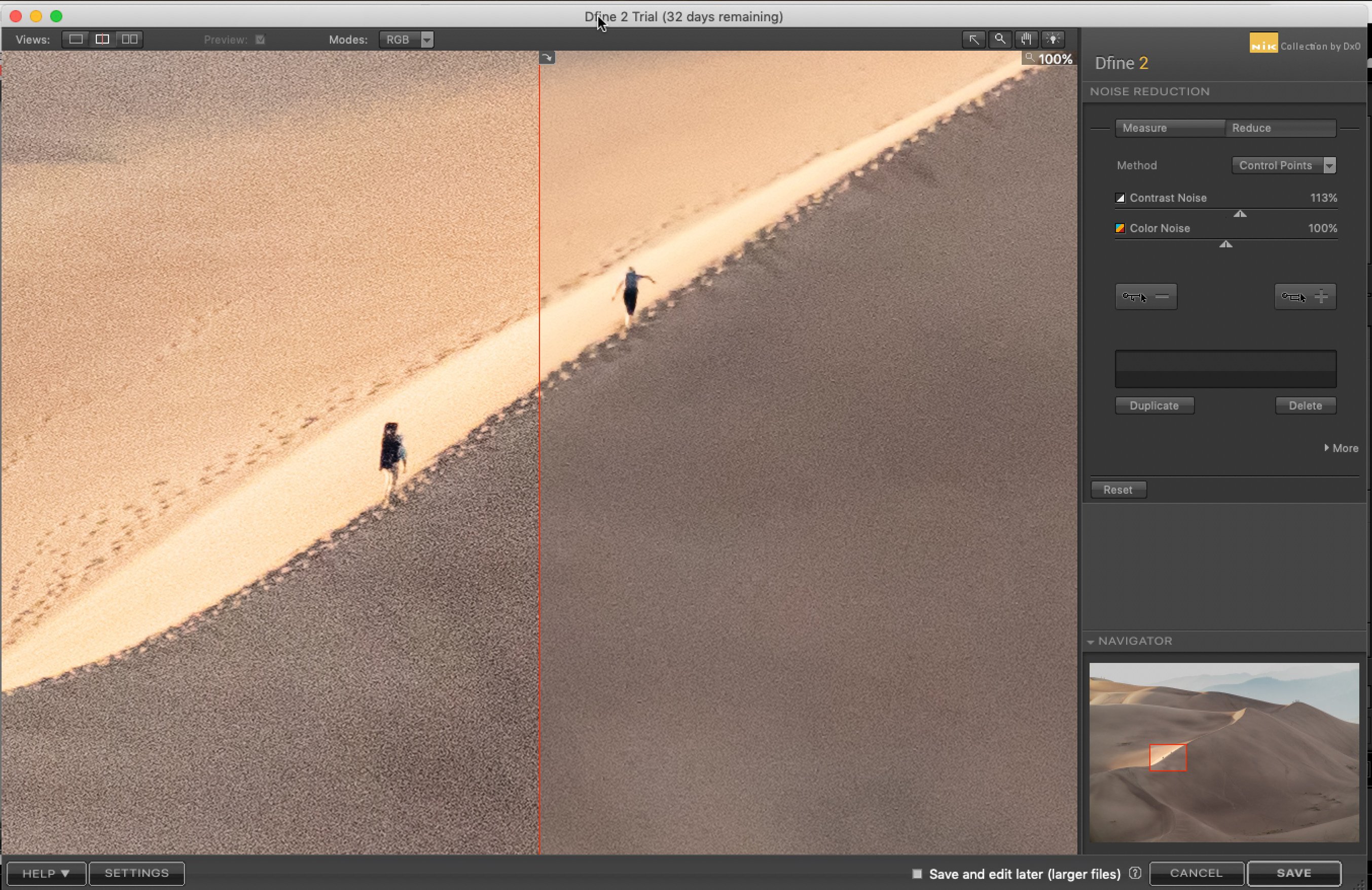
The results of the Dfine tool lag behind competitor's noise reduction programs.
Conclusion
The Nik Collection is no longer free. But the DxO version of the Nik Collection will definitely be worth the price when the entire suite is updated and ready to go. For photographers who purchased Nik Collection 3, the price seems a bit steep for each upgrade.
But you be the judge. DxO offers a free 30-day trial.
If you’re ready to master Lightroom, check out our Effortless Editing With Lightroom eBook.
If you’re already here, why not take a look at our DxO PhotoLab 5 review, too!






